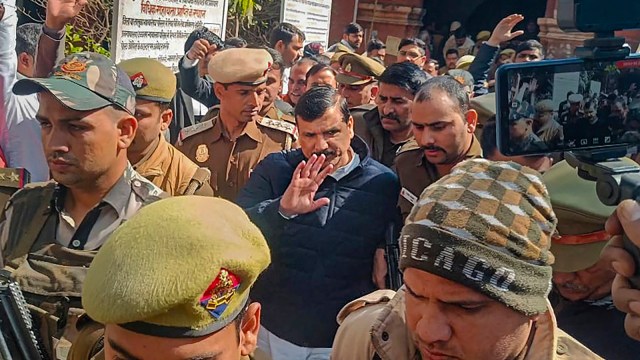‘New excise policy made to suit co-accused…’: HC refuses bail to AAP’s Sanjay Singh
The HC, however, said that Singh is entitled to a “fair trial” and directed the trial court to “expedite” the trial in the present case once it commences.
 Jailed Aam Aadmi Party (AAP) lawmaker Sanjay Singh being produced in the special court of MP-MLA in connection with the 'dera dalo dera dalo' case, in Sultanpur, Wednesday, Feb. 7, 2024. (PTI Photo)
Jailed Aam Aadmi Party (AAP) lawmaker Sanjay Singh being produced in the special court of MP-MLA in connection with the 'dera dalo dera dalo' case, in Sultanpur, Wednesday, Feb. 7, 2024. (PTI Photo) The Delhi High Court Wednesday refused to grant bail to AAP leader Sanjay Singh in a money laundering case on the now-scrapped excise policy being probed by the Enforcement Directorate.
A single-judge bench of Justice Swarana Kanta Sharma, in its 43-page judgment, observed, “Thus, prima facie, it is clear that the present applicant (Singh) was part of the preparation of the old excise policy and thereafter, the new excise policy was made to suit the co-accused(s) who were to pay kickbacks to the present applicant and co-accused(s) and the party concerned, from the profit so generated due to excise policy”.
The court added, “There are specific statements that Rs 2 crore was paid to Sarvesh Mishra for Sanjay Singh at his official residence in lieu of the new excise policy made to suit them and generate profit for them… the role at this stage of the applicant cannot completely be ruled out”.
The HC said “specific allegations” about the time, place and manner when the meetings and conversations took place between (co-accused) Dinesh Arora, Vivek Tyagi, Sarvesh Mishra, Vijay Nair, Manish Sisodia, Sanjay Singh etc., “cannot be disregarded at this stage”. “In view of the aforesaid discussion, no ground for grant of bail is made out at this stage… The accused in this case is entitled to a fair trial… this court directs the trial court to expedite the trial…,” Justice Sharma said.
The HC also took note of approver Dinesh Arora’s statement, recorded under PLMA Section 50; he said he had been “threatened by Vijay Nair, AAP’s former communication in-charge, in London in August 2022 that going against Deputy CM or Singh or other big political leaders will give a lot of trouble to him”.
The HC also noted Arora’s statement, recorded in July 2023 under Section 164 CrPC before the magisterate’s court, where he said he had been threatened by Nair not to name any political leader; so he had not disclosed their specific names, which he had disclosed in his PMLA statement recorded last August.
The HC said that the approver and his statements would be “put to the test of cross-examination” and the evidentiary value of the statement would be “adjudged on the touchstone” of cross-examination.
It said at the stage of consideration of bail of a person accused of committing money laundering under PMLA, the court is not required to conduct a “mini-trial” to return a finding of guilt. Rather, the material on record is to be examined, the HC said, to reach a conclusion on whether there are any reasonable grounds to believe the accused is guilty of the offence.







